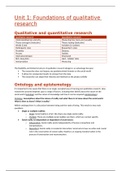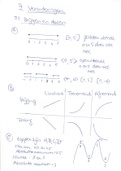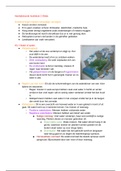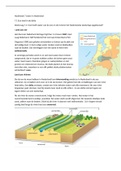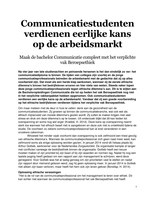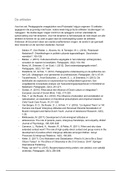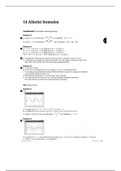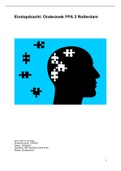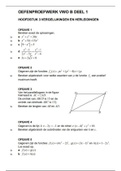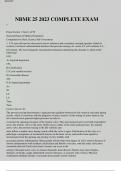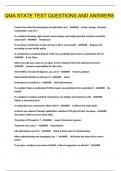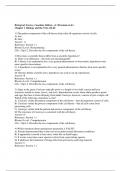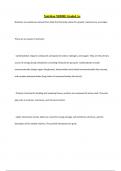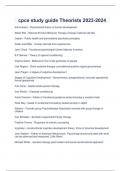Unit 1: Foundations of qualitative
research
Qualitative and quantitative research
Qualitative research Quantitative research
Understanding how and why Measuring how many and causality
Theory emergent (inductive) Theory testing (deductive)
Words & text Variables & numbers
Participants’ view Researcher’s view
Proximity Distance
Process Statistic
Unstructured/open Structured
Rich, deep data Hard, ‘reliable’ data
Interpretation Measuring
The flexibility and limited structure of qualitative research designs is an advantage because:
The researcher does not impose any predetermined formats on the social world
It allows for unexpected results to emerge from the data
The researcher can adapt their theories and methods as the project unfolds
Ontology and epistemology
It is important to be aware that there is no single, accepted way of carrying out qualitative research. How
researchers proceed depends upon a range of factors, including their beliefs about the nature of the
social world (ontology) and the nature of knowledge and how it can be acquired (epistemology).
Ontology: Assumptions about the nature of reality and what there is to know about the social world.
What is there to know?/What is reality?
Within ontology there is a discussion between being and the state of being. This entails to two main
questions:
Single or multiple realities:
o Single: Social reality is a fact. We share one single social reality.
o Multiple: There are multiple social realities out there, which are context specific.
Social reality is independent or dependent of social actors:
o Independent: Social reality exists independently of human conceptions and
interpretations.
o Dependent: Social reality is created in interaction. Social actors have an active and crucial
role in the construction of social reality. Reality is an ongoing transformation in the
process of construction and reconstruction.
,Two types of ontological positions:
Objectivism (also referred to as realism): An external reality exists independent of our beliefs or
understanding. Objectivists would say that social phenomena exist as social facts. Social
phenomena are independent social actors. In summary:
o Single or multiple realties? Single shared social reality.
o Dependent or independent from human conceptions? Social reality exists independently
of human conceptions (independent of social actors and interpretations).
Example: It’s a social fact that some people are Dutch and others are not. This social phenomena,
being Dutch, is pretty independent from social actors and what we try to accomplish. So, an
objectivist would say: There is such a thing as a cultural identity. It's out there (it’s a social
phenomena) and it can act as an independent variable.
Constructivism (also referred to as idealism): No external reality exists independent of our
beliefs and understandings. Social reality is dependent from social actors. So, while people are
talking/lecturing/discussing they create stuff. A constructivist says that there is not a single reality
out there, there are multiple social realities and people use different aspects in local interaction
and locally construct new realities. In summary:
o Single or multiple realties? Multiple social realities.
o Dependent or independent from human conceptions? Social reality is dependent of social
actors (we are creating social reality in interaction)
Example: In the lecture it is said that the lecturer is Dutch. But, why is he Dutch? He is Dutch
because it’s really handy to explain constructivism and objectivism. This Dutchness is used
rhetorically. By using this example of Dutchness the lecturer creates, interactively with the
students, the idea of social phenomena as stable facts.
,Epistemology: Beliefs about how we can acquire knowledge. Epistemology is concerned with questions
about how we know/examine reality.
Within epistemology there is a discussion between what is considered acceptable knowledge and how can
we study this? This entails to two main questions:
What should be considered acceptable knowledge in a discipline?
o Information provided by the senses: Study reality by using our senses: we can see it, hear
it, smell it, touch it, taste it. Observe behaviour and look for relations in cause and effect.
o Information gathered with different methods and procedures: We need to understand
individuals behaviour in an emphatic way, because we need to gasp their point of view
about reality in which they live. You need to make sense of the world from the
individuals point of view instead of observing their behaviour and looking for relations in
cause and effect.
Can the social world be studied according to the same principles as the natural sciences?
o Natural sciences
o You can’t use natural science:
Objectivism Positivism: If we assume that there is an external reality, it follows that we can
study this reality by using our senses: we can see it, hear it, smell it, touch it, taste it. The idea
that we can know reality through using our senses is called positivism.
o Acceptable knowledge? Information provided by the senses.
o Study social world according to principles natural sciences? Yes.
Constructivism Interpretivism: How people construct meaning from their experiences. If we
believe that reality is constructed we have to adopt a different way of gaining knowledge about
this constructed reality. For example, we have to acknowledge that people construct realities in
different ways, and we have to find out how people construct meaning.
o Acceptable knowledge? Adopt a different way of gaining knowledge about constructed
reality.
o Study social world according to principles natural sciences? No.
Paradigms
, Paradigm = Ontology + Epistemology. Particular combinations of ontological and epistemological beliefs
are called paradigms.
Different paradigms:
Positivism: Historically, the first scientific paradigm is referred to as positivism. Positivism adopts an
objectivist ontological position and a realist epistemology. In other words positivists assume that there is
an external reality, and that we can know this reality by using our senses. This position has been nuanced
later, as scientists became convinced that reality can never be fully known. This nuanced version of
positivism is called post-postivism. However, post-positivism still adopts a rather objectivist approach to
scientific inquiry.
Interpretivism: From the seventies onwards, different paradigms started to develop. This intrepretevist
paradigm posits that it is important to find out how people understand and interpret the word around
them. After all, if men define situations as real, they are real in their consequences.
Constructionism: Constructionist paradigms, of which there are many, go even a step further. If people
construct the reality in which they live, so do researchers. It is therefore important for social researchers
to reflect continuously on their own role. Another insight brought by constructionist approaches is the
recognition of the importance of language. After all, it is through language that people construct meaning.
This insight is referred to as the linguistic turn.
Critical theory: Critical theory also assumes that realities are constructed, but these researchers are not
interested in individual constructions, but in how society as a whole is constructed, and how historical
forces create the society that we have. Thus, critical theorists do not take 'society' for granted, but
acknowledge the influence of power structures which they seek to reveal.
Postmodernism: Postmodernism perspectives are characterised by a deep scepticism and suspicion of
scientific attempts to provide objective explanations of reality.
Action research: Furthermore, acknowledging the role of researchers themselves in constructing realities
has given rise to (participatory) action research. Realizing that they are part of the construction,
researchers came to feel responsibility for the outcomes of their research. This has lead researchers to
adopt research approaches that question existing realities, as in critical theory, or that would result in
concrete benefits for the people involved, such as action research.
research
Qualitative and quantitative research
Qualitative research Quantitative research
Understanding how and why Measuring how many and causality
Theory emergent (inductive) Theory testing (deductive)
Words & text Variables & numbers
Participants’ view Researcher’s view
Proximity Distance
Process Statistic
Unstructured/open Structured
Rich, deep data Hard, ‘reliable’ data
Interpretation Measuring
The flexibility and limited structure of qualitative research designs is an advantage because:
The researcher does not impose any predetermined formats on the social world
It allows for unexpected results to emerge from the data
The researcher can adapt their theories and methods as the project unfolds
Ontology and epistemology
It is important to be aware that there is no single, accepted way of carrying out qualitative research. How
researchers proceed depends upon a range of factors, including their beliefs about the nature of the
social world (ontology) and the nature of knowledge and how it can be acquired (epistemology).
Ontology: Assumptions about the nature of reality and what there is to know about the social world.
What is there to know?/What is reality?
Within ontology there is a discussion between being and the state of being. This entails to two main
questions:
Single or multiple realities:
o Single: Social reality is a fact. We share one single social reality.
o Multiple: There are multiple social realities out there, which are context specific.
Social reality is independent or dependent of social actors:
o Independent: Social reality exists independently of human conceptions and
interpretations.
o Dependent: Social reality is created in interaction. Social actors have an active and crucial
role in the construction of social reality. Reality is an ongoing transformation in the
process of construction and reconstruction.
,Two types of ontological positions:
Objectivism (also referred to as realism): An external reality exists independent of our beliefs or
understanding. Objectivists would say that social phenomena exist as social facts. Social
phenomena are independent social actors. In summary:
o Single or multiple realties? Single shared social reality.
o Dependent or independent from human conceptions? Social reality exists independently
of human conceptions (independent of social actors and interpretations).
Example: It’s a social fact that some people are Dutch and others are not. This social phenomena,
being Dutch, is pretty independent from social actors and what we try to accomplish. So, an
objectivist would say: There is such a thing as a cultural identity. It's out there (it’s a social
phenomena) and it can act as an independent variable.
Constructivism (also referred to as idealism): No external reality exists independent of our
beliefs and understandings. Social reality is dependent from social actors. So, while people are
talking/lecturing/discussing they create stuff. A constructivist says that there is not a single reality
out there, there are multiple social realities and people use different aspects in local interaction
and locally construct new realities. In summary:
o Single or multiple realties? Multiple social realities.
o Dependent or independent from human conceptions? Social reality is dependent of social
actors (we are creating social reality in interaction)
Example: In the lecture it is said that the lecturer is Dutch. But, why is he Dutch? He is Dutch
because it’s really handy to explain constructivism and objectivism. This Dutchness is used
rhetorically. By using this example of Dutchness the lecturer creates, interactively with the
students, the idea of social phenomena as stable facts.
,Epistemology: Beliefs about how we can acquire knowledge. Epistemology is concerned with questions
about how we know/examine reality.
Within epistemology there is a discussion between what is considered acceptable knowledge and how can
we study this? This entails to two main questions:
What should be considered acceptable knowledge in a discipline?
o Information provided by the senses: Study reality by using our senses: we can see it, hear
it, smell it, touch it, taste it. Observe behaviour and look for relations in cause and effect.
o Information gathered with different methods and procedures: We need to understand
individuals behaviour in an emphatic way, because we need to gasp their point of view
about reality in which they live. You need to make sense of the world from the
individuals point of view instead of observing their behaviour and looking for relations in
cause and effect.
Can the social world be studied according to the same principles as the natural sciences?
o Natural sciences
o You can’t use natural science:
Objectivism Positivism: If we assume that there is an external reality, it follows that we can
study this reality by using our senses: we can see it, hear it, smell it, touch it, taste it. The idea
that we can know reality through using our senses is called positivism.
o Acceptable knowledge? Information provided by the senses.
o Study social world according to principles natural sciences? Yes.
Constructivism Interpretivism: How people construct meaning from their experiences. If we
believe that reality is constructed we have to adopt a different way of gaining knowledge about
this constructed reality. For example, we have to acknowledge that people construct realities in
different ways, and we have to find out how people construct meaning.
o Acceptable knowledge? Adopt a different way of gaining knowledge about constructed
reality.
o Study social world according to principles natural sciences? No.
Paradigms
, Paradigm = Ontology + Epistemology. Particular combinations of ontological and epistemological beliefs
are called paradigms.
Different paradigms:
Positivism: Historically, the first scientific paradigm is referred to as positivism. Positivism adopts an
objectivist ontological position and a realist epistemology. In other words positivists assume that there is
an external reality, and that we can know this reality by using our senses. This position has been nuanced
later, as scientists became convinced that reality can never be fully known. This nuanced version of
positivism is called post-postivism. However, post-positivism still adopts a rather objectivist approach to
scientific inquiry.
Interpretivism: From the seventies onwards, different paradigms started to develop. This intrepretevist
paradigm posits that it is important to find out how people understand and interpret the word around
them. After all, if men define situations as real, they are real in their consequences.
Constructionism: Constructionist paradigms, of which there are many, go even a step further. If people
construct the reality in which they live, so do researchers. It is therefore important for social researchers
to reflect continuously on their own role. Another insight brought by constructionist approaches is the
recognition of the importance of language. After all, it is through language that people construct meaning.
This insight is referred to as the linguistic turn.
Critical theory: Critical theory also assumes that realities are constructed, but these researchers are not
interested in individual constructions, but in how society as a whole is constructed, and how historical
forces create the society that we have. Thus, critical theorists do not take 'society' for granted, but
acknowledge the influence of power structures which they seek to reveal.
Postmodernism: Postmodernism perspectives are characterised by a deep scepticism and suspicion of
scientific attempts to provide objective explanations of reality.
Action research: Furthermore, acknowledging the role of researchers themselves in constructing realities
has given rise to (participatory) action research. Realizing that they are part of the construction,
researchers came to feel responsibility for the outcomes of their research. This has lead researchers to
adopt research approaches that question existing realities, as in critical theory, or that would result in
concrete benefits for the people involved, such as action research.


